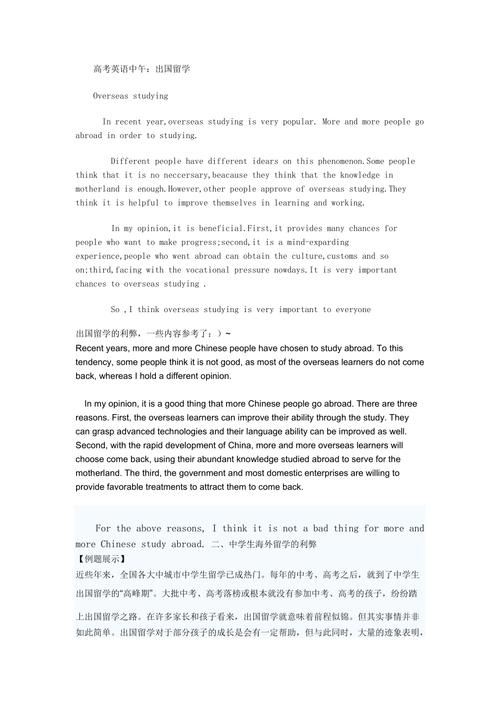来中国留学的好处英语作文
```html
Advantages and Disadvantages of Studying Abroad
In recent years, studying abroad has become increasingly popular among young people seeking higher education. While there are many benefits to studying in a foreign country, there are also some drawbacks to consider. Let's explore the advantages and disadvantages of studying abroad:
1. Cultural Exposure:
One of the biggest advantages of studying abroad is the exposure to a new culture. Students have the opportunity to immerse themselves in a different way of life, learn new customs and traditions, and broaden their perspective on the world.
2. Language Skills:
Studying in a foreign country provides an excellent opportunity to improve language skills. Being surrounded by native speakers can significantly enhance language proficiency and fluency, which is a valuable skill in today's globalized world.
3. Personal Growth:
Living independently in a foreign country can help students develop valuable life skills such as problemsolving, adaptability, and resilience. It can also boost selfconfidence and independence, leading to personal growth and maturity.
4. Academic Opportunities:
Many universities abroad offer unique academic programs and cuttingedge research opportunities that may not be available in the student's home country. Studying abroad can broaden academic horizons and provide access to a wider range of educational resources.
1. Homesickness:
Being far away from family and friends can lead to feelings of homesickness and loneliness. Adjusting to a new culture and environment can be challenging, and some students may struggle with feelings of isolation.
2. Financial Costs:
Studying abroad can be expensive, with costs including tuition, accommodation, travel, and living expenses. For many students, financial constraints can be a significant barrier to studying in a foreign country.
3. Language Barriers:
While studying abroad can improve language skills, students may initially face challenges in communication and understanding due to language barriers. This can impact academic performance and social integration in the host country.
4. Cultural Differences:

Adapting to a new culture can be both rewarding and challenging. Students may experience culture shock, misunderstandings, or discrimination in a foreign country, which can affect their overall study experience.
Studying abroad offers a wealth of opportunities for personal, academic, and professional growth. However, it is essential for students to carefully weigh the advantages and disadvantages before making a decision. By considering factors such as cultural exposure, language skills, personal growth, and potential challenges like homesickness and financial costs, students can make an informed choice about whether studying abroad is the right path for them.
